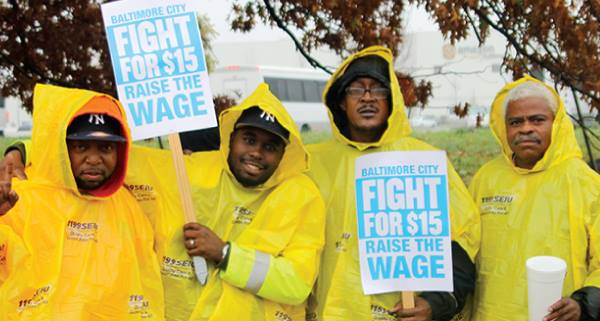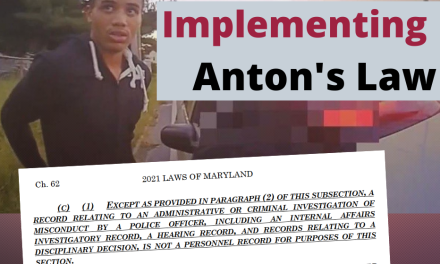By Dan Menefee
For Maryland Reporter
The fight for a $15 minimum wage went before the House Economic Matters Committee on Tuesday — and not all businesses are opposed to this national push for higher pay.
“Valuing workers is the best way to build and sustain our economy,” said T.J. Zlotnitsky, chairman and CEO of iControl Data Solution, at a press conference prior to the hearing. “Our economy is 70% consumer driven and can only grow and prosper when ordinary Americans have the means to participate in it. This only happens when workers are motivated, respected and fairly compensated.”
Zlotnitsky is a member of Patriotic Millionaires, a group of “high-net worth Americans” calling for a higher standard of living for “regular Americans” and an increase in the corporate tax rate. Zlotnitsky said his lowest paid employee earns $17.85 an hour.
He and other members of the group were in Annapolis on Tuesday to support HB1416, a bill to phase in the minimum wage to $15 an hour by 2023. It is sponsored by Del. Jeff Waldstreicher, D-Montgomery, and 46 other House Democrats.
Supporting families, fixing their cars
Suzanne Nash of Mom’s Organic Market, a chain with stores in four states and D.C., said a minimum wage should be enough to support a family.
“There is no reason that a person working full time shouldn’t be able to support themselves and their family, but that is what happens with the current state minimum wage.”
Brian England, president of British American Auto Care in Columbia, said a gradual increase to the minimum wage would have a positive effect on businesses by putting money in the pockets of consumers.
“Raising the minimum wage helps businesses and the economy by putting more money in the hands of those most likely to spend it,” he told the committee on behalf of Business for a Fair Minimum Wage.
He said he’s had customers forced to choose between replacing a battery or replacing bald tires.
England also said a higher minimum wage would reduce the reliance on public assistance. He said public assistance has amounted to a government subsidy for employers “who pay poverty wages.”
Driving up costs
But other businesses testified that a $15 minimum wage would drive up costs.
Joe Parsley, owner of Frederick Shell Carwash, said he’s been hurt under the 2014 minimum wage law, which will go up again next year to $10.10 from the current $8.75 and $9.25 on July 1.
He said his payroll has increased by $80,000 over the last two years and if the bill passes his payroll will increase by nearly $500,000 by 2024.
“Where in the world does this money come from,” he lamented to the committee. “Do you want to pay an extra 30 cents a gallon for gas, or $70 to get your car washed?”
Cailey Locklair Tolle, president of the Maryland Retailers Association, said major retail chains have been hit hard by “rising operational costs” and that keeping doors often meant reduced benefits and layoffs. She said Maryland lost 12,000 retail jobs in the past decade.
Caregivers raise cost to state
The Maryland Association of Community Services, a group that advocates for caregivers serving Marylanders with developmental disabilities, testified in support of the bill because it mandates an annual 3.5% rate increase to the Developmental Disabilities Administration to cover wage hikes for workers serving the disabled. It ensures wages for caregivers remain above the minimum wage to prevent further erosion of the workforce.
Gov. Larry Hogan cut the 3.5% down to 2% in this year’s budget that was mandated in the 2014 minimum wage law that brings the minimum to $10.10 by 2018.
Laura Howell, executive director for MACS, suggested an amendment would be needed to sustain the increases past fiscal 2023, when the mandate runs out under the bill.
Total state expenditures increase $148 million to fund DDA mandatory increases through 2022, according to the fiscal note. Local governments would also need to pay some workers more.
The Maryland legislature in 2014 voted to phase in minimum wage hikes over four years. That law included the 3.5% mandatory increase to disability workers to ensure they make more than the minimum wage.
Under the bill wage increases depend on the on the size of the company, smaller companies are given an additional year to get to $15. And beginning 2024 minimum wage increases are tied to the Consumer Price Index.
The Baltimore City Council took a preliminary vote Monday to raise the minimum wage in the city to $15.
The Montgomery County Council voted to raise the minimum wage there to $15 an hour, but County Executive Ike Leggett vetoed the measure.
Dan Menefee can be reached at dcmenefee@atlanticbb.net





Go ahead – kill off the rest of the meager jobs maryland has left. At 15.00 an hour you’ll soon be paying them welfare, unemployment and food stamps – that is the Democrat plan isn’t it? Keep em poor and relying on the government for everything.
There should be no minimum wage! Government has NO RIGHT to tell a private business what it should pay an employee. Let the market decide.
It’s unfortunate that some adults are stuck at low wages. However, just paying them more is not the answer. Raising the cost of goods for the middle class so that we can pay unskilled workers a high high is simply another form of welfare. At what point does it become the responsibility of the worker to climb out…as I did and most people do? We all start at minimum wage. I became a millionaire at age 46 by climbing out, saving and living below my means. And I don’t own a business. I’m a working still like most people. If you put your mind to it, you can get out. If you save, you can build wealth. That’s the lesson we need to teach. And Deb…you are spot-on. If we can use ATM’s to handle our MONEY, I can certainly order a burger myself as well. All we will accomplish with artificially higher wages is more expensive goods, closing businesses and automating jobs. We all lose…but low income workers lose the most.
$15.00/hour is what an entry-level firefighter/EMT earns in many cities and their jobs include dangers that no cashier or order taker will face…
There’s a video out that shows a “$15.00/hour protestor” arrogantly saying that her “fast food” job was more important and more worthy than that of the firefighter/EMT who would risk harm to save them…
If these “millionaires” think that paying $15.00/hour is so great… Let them pay it and absorb the increased costs for the rest of us !
The reason I support this is that I want people in other states to physically see what happens when labor becomes too expensive. I want them to see robots making tacos and burgers, and automated ordering at the drive through. Wendy’s by the way is already doing this. Keep in mind, this does nothing to facilitate people getting jobs. People who are too expensive to employ at $7 will be too expensive at $15.
This will be an excellent policy experiment. Sometime one’s purpose in life is to serve as a warning to others, that seems to be Maryland’s purpose.
Good point, dwb1. It astounds me that proponents of this bill cannot see that if you mandate a higher minimum wage, there are only the following consequences: higher cost to the consumer for goods and services, more automation and/or fewer jobs. There is a limit to how much can be passed on to the consumer so this means that most of it will have to be absorbed by layoffs, with or without automation replacement. Most people would be astonished to see how little money most small business owners actually make after paying for all the costs of running the business.
Minimum wage was never intended to be a living wage. It was intended as a way a means to provide a foot in the door into the workplace for young adults, who would then move on to better paying jobs once they had job experience. It was never intended to support a career serving fast-food.
Wendy’s just purchased ordering kiosks for 1,000 restaurants…
I think that McDonald’s is following suit…
Panera Bread has automated order taking…
Chili’s has tablets at the table for payment of meals… Eliminating the need for a waiter or waitress to process the bill for a meal…
I could go on…